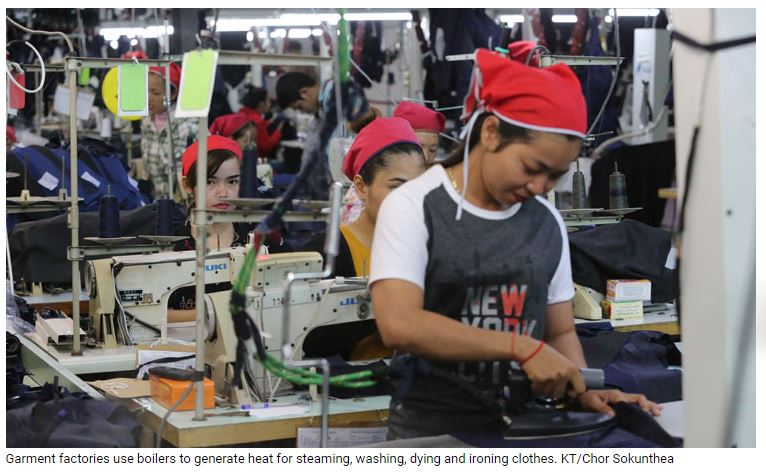Cambodia: Garment industry waste-to-energy boilers pose potential threats
While waste-to-energy boilers at garment factories can save operators on upfront costs and reduce physical waste at landfills, their inefficient operation can have disastrous effects on the environment and human health, experts say.
A recent webinar hosted by the United Nations Development Programme (UNDP) and Switch Garment weighed the pros and cons of increasing reliance on waste-to-energy (WTE) boilers.
WTE boilers incinerate fabric scraps and convert them into energy whereas typical boilers use biomass, agricultural waste and wood for fuel.
According to a presentation by UNDP Cambodia’s Climate Change and Environmental Policy Specialist Leif Holmberg, WTE boilers can have a positive or negative overall environmental impact depending on the technology used and the diligence of their operators.
If temperatures are strictly controlled, the right mixture of waste products are used as fuel and new technology is precisely installed and fine-tuned, waste-to-energy boilers can be effective and environmentally sound, according to multiple panellists at the webinar.
UNDP Cambodia Country Representative Nick Beresford said factories must be able to invest in this technology and carefully monitor the incineration process for WTE boilers to be considered an environmentally safe solution.
“The advantage is that waste is turned into energy instead of being left to a landfill,” he said. “However, if the factory is not able to achieve good emission control, the technology should not be used.”
Beresford continued: “With high-quality technology, the right mix of fuel and trained operators, the emissions of air pollution can be controlled. Most important is that factories invest in environmental control of their operations.”
He added that studies have shown using a poor mixture of waste as fuel, having incineration temperatures which are too low or using poorly maintained boilers can dramatically increase the amount of harmful air pollutants created by WTE boilers.
These air pollutants include nitrogen oxides, particulate matters, carbon monoxide and dioxins – toxic chemical compounds that can cause cancer in humans and create long-term respiratory issues.
Judging from the results of a 2019 UNDP study that focused on three factories in Cambodia using WTE boilers, maintaining ideal conditions for operating these boilers is a tall task.
The factories used plastic bags and domestic waste including plastic bottles and food containers as fuel for the boilers.
While the boiler certificates were supposedly in compliance with international emission limits, the factories tested far above the Singapore standard limits for particulates, dioxins and carbon monoxide and well over the European limit for heavy metals.
These results were attributed to “irregular or too frequent loading, inappropriate mixture of fabric types and non-fabric plastic waste, wrong attention to combustion conditions [temperature and pressure] and modified combustion chambers,” according to a presentation made by Aude Petelot, a regional technical adviser at international development nongovernmental organisation, Geres.
A representative at Sweden-based garment giant H&M said WTE boilers went against the company’s environmental standards.
“H&M Group policy on on-site fabric waste boilers is clear: They do not follow our strategy on material circularity and are therefore not the best solution for heat generation and waste management. In Cambodia we are working closely with existing units that use this technology to find alternative electric or biomass solutions,” the representative said.
An industry insider not authorised to speak to the media likewise said WTE incinerators should be off-limits.
“While fabric boilers offer a quick and cheap solution to generate heat and deal with fabric waste, it is not a solution that meets buyer or factory environmental and sustainability requirements. Factories should instead focus on reducing the amount of waste they produce and using recycling options for any other waste,” he said.
The Garment Manufacturers Association in Cambodia did not respond to requests for comment.
Source: https://www.khmertimeskh.com/50880129/garment-industry-waste-to-energy-boilers-pose-potential-threats/


 Thailand
Thailand




